Gateway E-155-C: A Lightweight Convertible
by Jarred Walton on July 4, 2007 12:05 AM EST- Posted in
- Laptops
LCD Color Accuracy
So far the LCD has done relatively well. Now let's take a look at how it performs in regards to color accuracy. Not everyone wants a glaringly bright display, and if the E-155-C can provide accurate colors at reduced intensities there will certainly be some interested parties. As stated, we will be looking at the uncalibrated performance as well as calibrated performance using both Monaco Optix XR Pro and ColorEyes Display Pro.
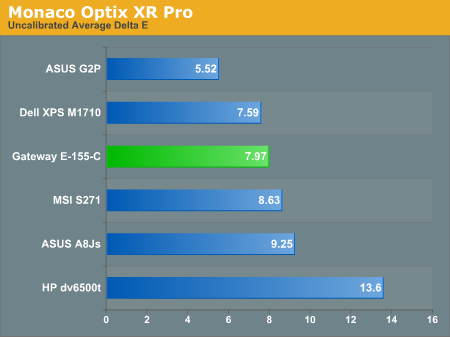
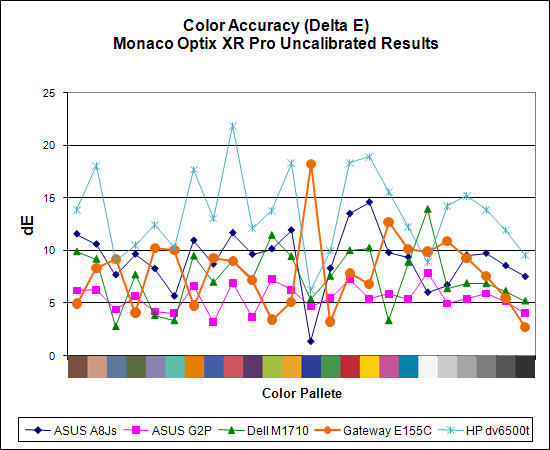
The uncalibrated results continue to be very poor for all of the laptops. Unfortunately, these results represent what the majority of people will see when they use any of these systems, and even if you're lucky enough to have appropriate calibration tools, video playback will still use the uncalibrated colors. The E-155-C is about average in terms of the laptops we've tested, with an average Delta E of 8.0 prior to calibration.
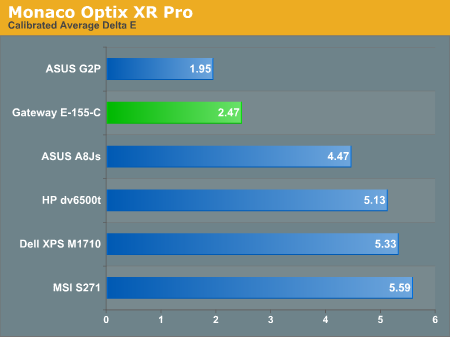
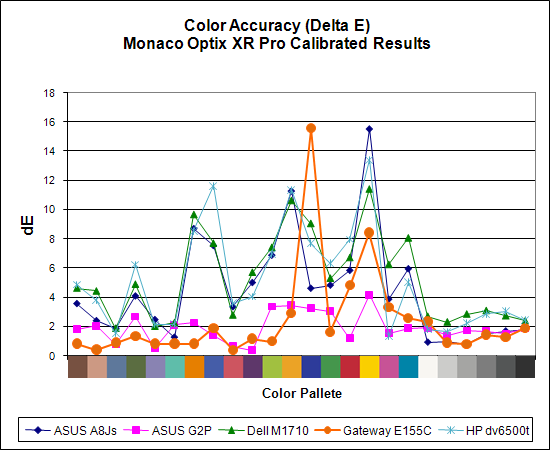
After calibration with Monaco Optix XR Pro, the situation for the E-155-C improves dramatically. It goes from the middle of the pack among generally poor results to having the second-best average Delta E. A score of 2.5 is still quite a bit higher than what most image professionals would like, and the huge spike on dark blue and relatively high spike on yellow are definitely undesirable. Without those two spikes, the average Delta E would improve to an impressive 1.6 - still not as good as the best desktop LCDs we've tested, but at that point the vast majority of users would no longer have any complaints about color accuracy. Now if only we could get a display that performs that well without calibration utilities....
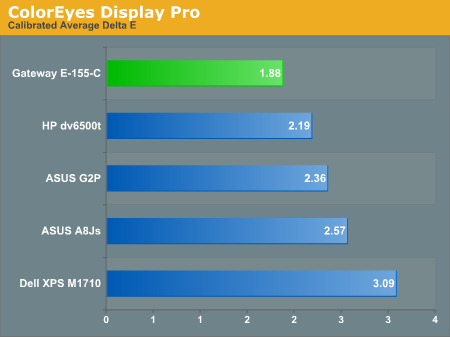
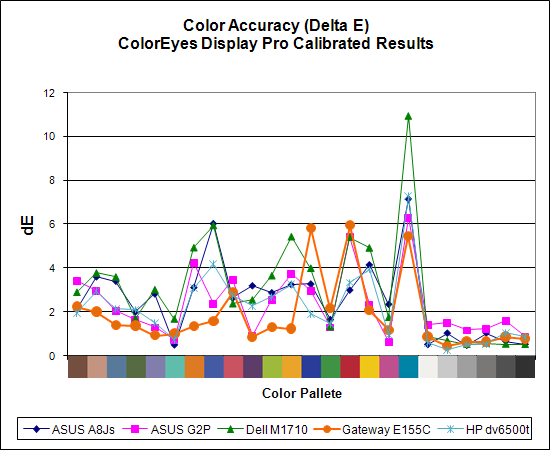
As we discovered in our last laptop article, ColorEyes Display Pro generally manages to provide even better color accuracy on laptops. The two software packages tend to have spikes on different colors, but the overall result usually improves. The average Delta E for the E-155-C when using ColorEyes Display Pro is reduced to 1.88, making it the best result we've seen from any laptop so far. However, it's worth noting that the ASUS G2P doesn't spike quite as high and overall we would still take that LCD over any of the others (size and weight considerations permitting).
We should also note that the default Delta E reported by ColorEyes is even better than what we're reporting here, but the selection of test colors is extremely limited. We validated color accuracy using a Gretag Macbeth chart, which is what Monaco Optix XR Pro uses. The default validation for ColorEyes uses 15 color swatches instead of 24, and the 15 swatches consist of 12 shades of gray and only three colors. While that may be fine for people that work in black and white, actual color accuracy means more to us, even if the display no longer scores a "perfect" Delta E of less than 1.0. (As an example of the distortion this sort of measuring can create, the E-155-C had an average Delta E of 0.286 using the default ColorEyes accuracy chart, thanks to nearly perfect scores in all of the various shades of gray.)
One final comment on the displays before we move on: trying to figure out the color management scheme of Windows Vista in comparison to Windows XP is more than a little confusing. In Windows XP, you set the default color profile and that's about it. Windows Vista has so many different options in the color profile section that we often wonder if we're doing things correctly; this is a case where we definitely don't feel that more is better! The color calibration software clearly enables a different color profile than what we normally get under Windows Vista even after we've supposedly look at the desired color profile. It seems that Microsoft is trying to help users improve their overall display experience, but the end result is simply confusing. (And don't even get us started on the irritation of having to jump through a couple extra dialogs in order to adjust the various display settings!)
So far the LCD has done relatively well. Now let's take a look at how it performs in regards to color accuracy. Not everyone wants a glaringly bright display, and if the E-155-C can provide accurate colors at reduced intensities there will certainly be some interested parties. As stated, we will be looking at the uncalibrated performance as well as calibrated performance using both Monaco Optix XR Pro and ColorEyes Display Pro.


The uncalibrated results continue to be very poor for all of the laptops. Unfortunately, these results represent what the majority of people will see when they use any of these systems, and even if you're lucky enough to have appropriate calibration tools, video playback will still use the uncalibrated colors. The E-155-C is about average in terms of the laptops we've tested, with an average Delta E of 8.0 prior to calibration.


After calibration with Monaco Optix XR Pro, the situation for the E-155-C improves dramatically. It goes from the middle of the pack among generally poor results to having the second-best average Delta E. A score of 2.5 is still quite a bit higher than what most image professionals would like, and the huge spike on dark blue and relatively high spike on yellow are definitely undesirable. Without those two spikes, the average Delta E would improve to an impressive 1.6 - still not as good as the best desktop LCDs we've tested, but at that point the vast majority of users would no longer have any complaints about color accuracy. Now if only we could get a display that performs that well without calibration utilities....


As we discovered in our last laptop article, ColorEyes Display Pro generally manages to provide even better color accuracy on laptops. The two software packages tend to have spikes on different colors, but the overall result usually improves. The average Delta E for the E-155-C when using ColorEyes Display Pro is reduced to 1.88, making it the best result we've seen from any laptop so far. However, it's worth noting that the ASUS G2P doesn't spike quite as high and overall we would still take that LCD over any of the others (size and weight considerations permitting).
We should also note that the default Delta E reported by ColorEyes is even better than what we're reporting here, but the selection of test colors is extremely limited. We validated color accuracy using a Gretag Macbeth chart, which is what Monaco Optix XR Pro uses. The default validation for ColorEyes uses 15 color swatches instead of 24, and the 15 swatches consist of 12 shades of gray and only three colors. While that may be fine for people that work in black and white, actual color accuracy means more to us, even if the display no longer scores a "perfect" Delta E of less than 1.0. (As an example of the distortion this sort of measuring can create, the E-155-C had an average Delta E of 0.286 using the default ColorEyes accuracy chart, thanks to nearly perfect scores in all of the various shades of gray.)
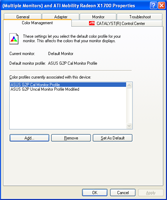 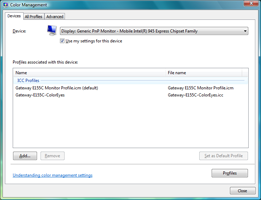 |
 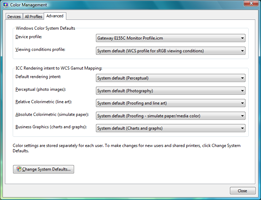 |
One final comment on the displays before we move on: trying to figure out the color management scheme of Windows Vista in comparison to Windows XP is more than a little confusing. In Windows XP, you set the default color profile and that's about it. Windows Vista has so many different options in the color profile section that we often wonder if we're doing things correctly; this is a case where we definitely don't feel that more is better! The color calibration software clearly enables a different color profile than what we normally get under Windows Vista even after we've supposedly look at the desired color profile. It seems that Microsoft is trying to help users improve their overall display experience, but the end result is simply confusing. (And don't even get us started on the irritation of having to jump through a couple extra dialogs in order to adjust the various display settings!)










25 Comments
View All Comments
DEMO24 - Wednesday, July 4, 2007 - link
stylus is the only way to make commands work on the screen.also if you configure the stylus right, then having the issue mentioned in the article is not a problem.
I carry a tablet around where I work. While I don't use the tablet function, its been pretty damn reliable. They seem to be a bit more durable than a normal laptop. This thing has seen its fair share of abuse, and it's never missed a beat.
JarredWalton - Wednesday, July 4, 2007 - link
You can interface with the display using a finger, but for a variety of reasons I would definitely recommend the stylus. You get better accuracy, you can easily click or right-click, and you don't leave fingerprints everywhere.Vidmar - Wednesday, July 4, 2007 - link
Page 10: The chart says "Batter Life". I guess you can't have your cake and eat it too! ;)Vidmar - Wednesday, July 4, 2007 - link
I wonder if you could get better battery life under XP tablet instead of Vista? Our E-155Cs are getting ~240-260 mins of battery life with the six cell battery under XP tablet while doing routine tasks and the display fully bright. (Which I agree is necessary)Also you had mentioned in the article that the display would dim sometimes all on its own. There is a BIOS option, ALS control (Ambient Light Sensor) that allows the machine to control display brightness using a sensor on the laptop. This reason for this option is when you would want/need to use it in daylight. The sensor senses the extreme brightness of daylight and lowers the brightness of the display so that it can be read in full sunshine. Unfortunately I think it’s a bit more sensitive and can also lower the display brightness when it really should not. This can be simply disabled in the BIOS.
JarredWalton - Wednesday, July 4, 2007 - link
It wouldn't surprise me if XP lasts a bit longer in terms of battery life. Vista seems like it tends to keep the CPU in a higher performance state, at least on other laptops. The HP dv6500t, for example, rarely ran at lower than 1.6 GHz, even though it could go as low as 800 MHz (or perhaps 1 GHz?). One of these days I'll have to do a better XP vs. Vista laptop comparison, just to see how things stand.MercenaryForHire - Wednesday, July 4, 2007 - link
Or at least beaten with a hose. I haven't used a telephone cable for anything other than the household phone for about ten years.And while the forward location of the (only) two USB ports makes it easy to pop in a memory stick or other peripheral, it makes using a mouse more than a slight nuisance as the cord will have to snake backwards across the optical drive.
Vidmar - Wednesday, July 4, 2007 - link
One aspect of this table pc that was missing from this article was that it also can be configured with Bluetooth. A Bluetooth mouse is the perfect companion for this machine. No wires, USB wireless adapters necessary.bldckstark - Friday, July 6, 2007 - link
USB wireless mouse = $12Bluetooth mouse = $80
Extra 3lbs of batteries you have to carry for the Bluetooth mouse = Priceless
At least that's what my Chiropracter said.
If you have to plug in a USB device to run your mouse, why not just use a wired one? Why bother with the batteries.
Visual - Wednesday, July 4, 2007 - link
that laptop is utter crap, it seems.only people that really want something ultra-light and don't care for performance at all would be interested... and they would be better off with a pda or smartphone, with an additional portable keyboard if they need a lot of typing.
i dont understand why laptop makers don't make a decent convertible - at least 13-15", with reasonable graphic card and all... and even bigger laptops, even if they're not too comfortable for holding in one hand can still benefit from a touchscreen and a tablet-like folding.
Vidmar - Wednesday, July 4, 2007 - link
This laptop/tablet is for those who need to run a queries against an database, while programming that new interface for the next rev of the accounting app, while reading their email, while taking notes tablet style, all while connected to the corporate VPN and never having to touch an electrical outlet for ~4.5 hours in those day long meetings.Do that on your PDA.